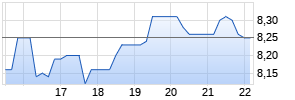
Retirees drive Canada's recreational property market, blurring the line between recreational and residential
Canada NewsWire
TORONTO and KELOWNA, BC, May 15, 2018
Retirees and Baby Boomers capitalize on high-value principal residences to enter active retirement at recreational properties
- Retirees are fueling demand: 91 per cent of regions surveyed reported that retirees drive demand for recreational properties
- One in three survey respondents (33 per cent) say that they own or want to own a recreational property for investment purposes
- Buyers are increasingly renting in urban centres such as Toronto and Vancouver while purchasing recreational properties
- Other than affordable purchase price, waterfront rated as the most important feature to Canadians when considering spending time at a cottage or cabin, beating out reasonable maintenance costs
TORONTO and KELOWNA, BC, May 15, 2018 /CNW/ - A recent survey of RE/MAX brokers and agents found that in 91 per cent of popular Canadian recreational property markets examined, retirees were the key factor driving activity. This includes established recreational regions such as Prince Edward County and Comox Valley. This is in stark contrast to last year's findings, when retirees were a dominant driving force in only 55 per cent of markets.
The survey found that in British Columbia, Ontario and Atlantic Canada, more retirees and soon-to-be retirees are purchasing recreational properties outside of urban centres for use as retirement homes, increasingly blurring the line between recreational and residential properties.
"Last year, we found that Baby Boomers and retirees were increasingly selling their homes in urban centres like Toronto and Vancouver," says Elton Ash, Regional Executive Vice President, RE/MAX of Western Canada. "It's clear that many put the equity they received from those sales into the purchase of a recreational property with the intention to retire in comfort and away from the city."
Many of these individuals are engaging in more active forms of retirement, choosing to maintain physical fitness and emotional fulfillment by pursuing passion projects and leading lifestyles that involve farming, hiking and maintaining vineyards. This is particularly the case in regions such as South Okanagan, Wasaga Beach and Rideau Lakes.
Due to the strong US dollar, retirees in the Sylvan Lake and Lake Winnipeg regions are selling their snowbird properties south of the border and purchasing recreational homes for use as retirement properties as well.
In a separate survey conducted by Leger, six in 10 Canadians (58 per cent) enjoy recreational properties as places where they can relax and spend time with friends and family. However, the majority of Canadians (84 per cent) do not actually own recreational properties.
"Many Canadians want to live out the 'Canadian Dream' and spend time at the cottage or cabin but today, that doesn't necessarily mean owning a recreational property outright," says Christopher Alexander, Executive Vice President and Regional Director, RE/MAX INTEGRA Ontario-Atlantic Canada Region. "Many are choosing to rent recreational properties, often by pooling resources with friends and family, which speaks to recreational properties still being in high demand."
In fact, one in three Canadians (33 per cent) say that they own or would want to own a recreational property for investment purposes. In Toronto specifically, the survey of RE/MAX brokers and agents found that in regions such as North Bay-Sunridge, Bancroft and the Bruce Peninsula, many owners of recreational properties actually rent their principal residences in Toronto, where they live most of the year. Using their recreational properties every so often while renting them out for the rest of the year, these individuals are renting a principal residence where they live while buying where they play.
In Leger's survey, more than half of Canadians (54 per cent) who own a recreational property, or are considering buying one, identify savings as their source of funding. Twenty per cent would use a loan, 20 per cent would rely on home equity and only 11 per cent would rely on inheritance.
The survey also found that other than affordable purchase price, Canadians who own or would consider owning a recreational property named waterfront access (55 per cent), reasonable maintenance costs (53 per cent) and proximity to town (43 per cent) as the most important factors when purchasing. The survey of RE/MAX brokers and agents, waterfront access was considered the most in-demand amenity in most regions, overall.
Key Findings from the 2018 RE/MAX Recreational Property Omnibus Survey
- One-quarter (24 per cent) of Canadians would consider buying a recreational property in the future.
- Canadians cite the following reasons to own or want to own a recreational property:
- It is where I can go and relax and spend time with friends and family = 58 per cent
- It is a getaway home = 46 per cent
- I can do activities I can't do at my permanent residence (hiking, fishing, etc.) = 41 per cent
- It is an investment property = 33 per cent
- It is a retirement home = 19 per cent
- Other = 4 per cent
- Canadians identify the following sources of down payment when considering their current recreational property or their next purchase of a recreational property:
- Savings = 54 per cent
- Loan = 20 per cent
- Home equity = 20 per cent
- Inheritance = 11 per cent
- Other = 4 per cent
- I don't know = 11 per cent
- I prefer not to answer = 3 per cent
- More than two-thirds (68 per cent) of Canadians who own or are considering owning a recreation property are willing to travel up to two hours, with 31 per cent saying they would travel two hours. Slightly less (28 per cent) are willing to travel three or more hours.
- Canadians identify the following features as important when considering their current recreational property or a future purchase of a recreational property:
- Affordable purchase price = 64 per cent
- Waterfront access = 55 per cent
- Reasonable maintenance costs = 53 per cent
- Proximity to town = 43 per cent
- Reasonable distance from primary residence = 37 per cent
- Relative seclusion = 33 per cent
- Land access = 30 per cent
- Proximity to sports/recreation = 25 per cent
- Accessible medical facilities = 24 per cent
- Nearby neighbouring properties = 15 per cent
- Island property = 12 per cent
- Other = 1 per cent
- None, don't mind which features my recreational property has = <1 per cent
- Don't know/prefer not to answer = 3 per cent
- Canadians 55 and older (vs <55), who own or would consider owning a recreational property are significantly more likely to say waterfront access, reasonable maintenance costs, proximity to a town, reasonable distance from primary residence and accessible medical facilities are important.
About the RE/MAX Network
RE/MAX was founded in 1973 by Dave and Gail Liniger, with an innovative, entrepreneurial culture affording its agents and franchisees the flexibility to operate their businesses with great independence. Over 120,000 agents provide RE/MAX a global reach of more than 100 countries and territories. RE/MAX is Canada's leading real estate organization with more than 20,000 Sales Associates and over 900 independently-owned and operated offices nationwide. RE/MAX, LLC, one of the world's leading franchisors of real estate brokerage services, is a subsidiary of RE/MAX Holdings, Inc. (NYSE: RMAX). With a passion for the communities in which its agents live and work, RE/MAX is proud to have raised millions of dollars for Children's Miracle Network Hospitals® and other charities. For more information about RE/MAX, to search home listings or find an agent in your community, please visit www.remax.ca.
About RE/MAX INTEGRA and RE/MAX INTEGRA, Ontario-Atlantic Canada
RE/MAX INTEGRA, founded in 1980, is a privately held company by Canadian entrepreneurs. With regional headquarters in Toronto, Boston, Minneapolis, Indianapolis, Zug, and Vienna, RE/MAX INTEGRA represents nearly a third of all RE/MAX Sales Associates worldwide. The company was founded on the premise of providing outstanding service and support both at the regional level and to the end consumer. The Ontario-Atlantic Canada region has surpassed 10,000 quality Associates; the US regions — New England and the Midwest (including the following states: Minnesota, Wisconsin and Indiana) – account for more than 6,500 Associates with over 2,600 and 3,800 Associates respectively; and the European region leads with more than 16,000 Associates. For more information about RE/MAX INTEGRA, visit www.remaxintegra.com.
About Leger
Leger is the largest Canadian-owned full-service market research firm. A survey of 1566 Canadians was completed online between April 20-23, 2018 using Leger's online panel, LegerWeb. Leger's online panel has more than 400,000 members nationally and has a retention rate of 90%. A probability sample of the same size would yield a margin of error of +/- 2.5%, 19 times out of 20.
Forward-Looking Statements
This press release includes "forward-looking statements" within the meaning of the "safe harbor" provisions of the United States Private Securities Litigation Reform Act of 1995. Forward-looking statements may be identified by the use of words such as "anticipate," "believe," "intend," "expect," "estimate," "plan," "outlook," "project" and other similar words and expressions that predict or indicate future events or trends that are not statements of historical matters. These forward-looking statements include statements regarding the future performance of the housing market, the Company's financial and operational outlook, the Company's belief that business fundamentals remain strong, as well as other statements regarding the Company's strategic and operational plans. Forward-looking statements should not be read as a guarantee of future performance or results, and will not necessarily be accurate indications of the times at, or by, which such performance or results will be achieved. Forward looking statements are based on information available at the time those statements are made and/or management's good faith belief as of that time with respect to future events, and are subject to risks and uncertainties that could cause actual performance or results to differ materially from those expressed in or suggested by the forward looking statements. Such risks and uncertainties include, without limitation, (1) changes in business and economic activity in general, (2) changes in the real estate market, including changes due to interest rates and availability of financing, (3) the Company's ability to attract and retain quality franchisees, (4) the Company's franchisees' ability to recruit and retain agents, (5) changes in laws and regulations that may affect the Company's business or the real estate market, (6) failure to maintain, protect and enhance the RE/MAX brand, (7) fluctuations in foreign currency exchange rates, as well as those risks and uncertainties described in the sections entitled "Risk Factors" and "Management's Discussion and Analysis of Financial Condition and Results of Operation" in the most recent Form 10-K filed with the Securities and Exchange Commission ("SEC") and similar disclosures in subsequent reports filed with the SEC, which are available on the investor relations page of the Company's website at www.remax.com and on the SEC website at www.sec.gov. Readers are cautioned not to place undue reliance on forward-looking statements, which speak only as of the date on which they are made. Except as required by law, the Company does not intend, and undertakes no duty, to update this information to reflect future events or circumstances.
SOURCE RE/MAX Ontario-Atlantic Canada

Mehr Nachrichten zur Re/max Holdings A Aktie kostenlos abonnieren
(Mit der Bestellung akzeptierst du die Datenschutzhinweise)

Hinweis: ARIVA.DE veröffentlicht in dieser Rubrik Analysen, Kolumnen und Nachrichten aus verschiedenen Quellen. Die ARIVA.DE AG ist nicht verantwortlich für Inhalte, die erkennbar von Dritten in den „News“-Bereich dieser Webseite eingestellt worden sind, und macht sich diese nicht zu Eigen. Diese Inhalte sind insbesondere durch eine entsprechende „von“-Kennzeichnung unterhalb der Artikelüberschrift und/oder durch den Link „Um den vollständigen Artikel zu lesen, klicken Sie bitte hier.“ erkennbar; verantwortlich für diese Inhalte ist allein der genannte Dritte.




